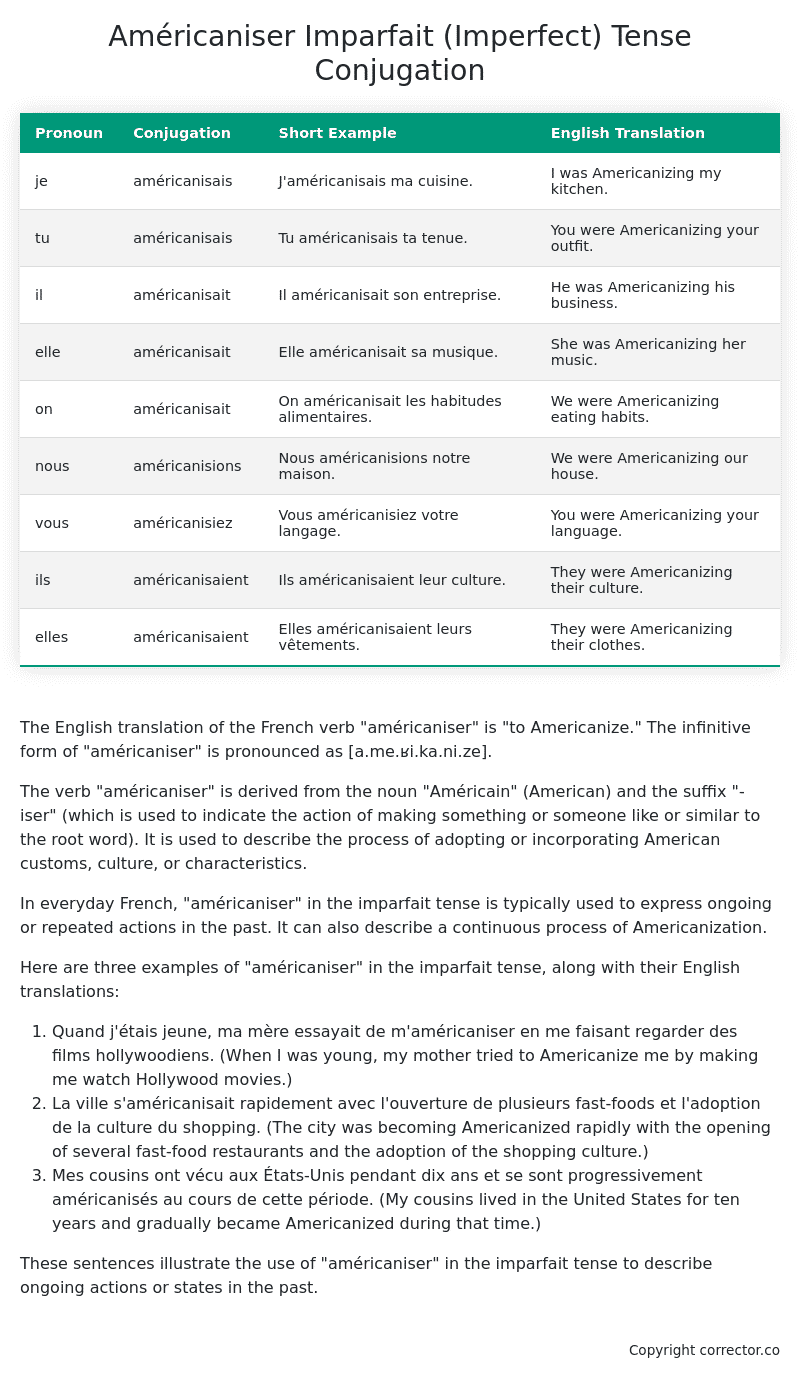Imparfait (Imperfect) Tense Conjugation of the French Verb américaniser
Introduction to the verb américaniser
The English translation of the French verb “américaniser” is “to Americanize.” The infinitive form of “américaniser” is pronounced as [a.me.ʁi.ka.ni.ze].
The verb “américaniser” is derived from the noun “Américain” (American) and the suffix “-iser” (which is used to indicate the action of making something or someone like or similar to the root word). It is used to describe the process of adopting or incorporating American customs, culture, or characteristics.
In everyday French, “américaniser” in the imparfait tense is typically used to express ongoing or repeated actions in the past. It can also describe a continuous process of Americanization.
Here are three examples of “américaniser” in the imparfait tense, along with their English translations:
- Quand j’étais jeune, ma mère essayait de m’américaniser en me faisant regarder des films hollywoodiens. (When I was young, my mother tried to Americanize me by making me watch Hollywood movies.)
- La ville s’américanisait rapidement avec l’ouverture de plusieurs fast-foods et l’adoption de la culture du shopping. (The city was becoming Americanized rapidly with the opening of several fast-food restaurants and the adoption of the shopping culture.)
- Mes cousins ont vécu aux États-Unis pendant dix ans et se sont progressivement américanisés au cours de cette période. (My cousins lived in the United States for ten years and gradually became Americanized during that time.)
These sentences illustrate the use of “américaniser” in the imparfait tense to describe ongoing actions or states in the past.
Table of the Imparfait (Imperfect) Tense Conjugation of américaniser
| Pronoun | Conjugation | Short Example | English Translation |
|---|---|---|---|
| je | américanisais | J’américanisais ma cuisine. | I was Americanizing my kitchen. |
| tu | américanisais | Tu américanisais ta tenue. | You were Americanizing your outfit. |
| il | américanisait | Il américanisait son entreprise. | He was Americanizing his business. |
| elle | américanisait | Elle américanisait sa musique. | She was Americanizing her music. |
| on | américanisait | On américanisait les habitudes alimentaires. | We were Americanizing eating habits. |
| nous | américanisions | Nous américanisions notre maison. | We were Americanizing our house. |
| vous | américanisiez | Vous américanisiez votre langage. | You were Americanizing your language. |
| ils | américanisaient | Ils américanisaient leur culture. | They were Americanizing their culture. |
| elles | américanisaient | Elles américanisaient leurs vêtements. | They were Americanizing their clothes. |
Other Conjugations for Américaniser.
Le Present (Present Tense) Conjugation of the French Verb américaniser
Imparfait (Imperfect) Tense Conjugation of the French Verb américaniser (You’re reading it right now!)
Passé Simple (Simple Past) Tense Conjugation of the French Verb américaniser
Passé Composé (Present Perfect) Tense Conjugation of the French Verb américaniser
Futur Simple (Simple Future) Tense Conjugation of the French Verb américaniser
Futur Proche (Near Future) Tense Conjugation of the French Verb américaniser
Plus-que-parfait (Pluperfect) Tense Conjugation of the French Verb américaniser
Passé Antérieur (Past Anterior) Tense Conjugation of the French Verb américaniser
Futur Antérieur (Future Anterior) Tense Conjugation of the French Verb américaniser
Subjonctif Présent (Subjunctive Present) Tense Conjugation of the French Verb américaniser
Subjonctif Passé (Subjunctive Past) Tense Conjugation of the French Verb américaniser
Subjonctif Imparfait (Subjunctive Imperfect) Tense Conjugation of the French Verb américaniser
Conditionnel Présent (Conditional Present) Tense Conjugation of the French Verb américaniser
Conditionnel Passé (Conditional Past) Tense Conjugation of the French Verb américaniser
Conditionnel Passé II (Conditional Past II) Tense Conjugation of the French Verb américaniser
L’impératif Présent (Imperative Present) Tense Conjugation of the French Verb américaniser
L’impératif Passé (Imperative Past) Tense Conjugation of the French Verb américaniser
L’infinitif Présent (Infinitive Present) Tense Conjugation of the French Verb américaniser
L’infinitif Passé (Infinitive Past) Tense Conjugation of the French Verb américaniser
Le Participe Présent (Present Participle) Tense Conjugation of the French Verb américaniser
Le Participe Passé (Past Participle) Tense Conjugation of the French Verb américaniser
Struggling with French verbs or the language in general? Why not use our free French Grammar Checker – no registration required!
Get a FREE Download Study Sheet of this Conjugation 🔥
Simply right click the image below, click “save image” and get your free reference for the américaniser imparfait tense conjugation!

Américaniser – About the French Imparfait Tense
NOTE: To take a deep dive into all the French tenses then see our article on Mastering French Tense Conjugation.
Formation of the Imparfait Tense
For regular -er verbs:
For regular -ir verbs
For regular -re verbs
Common Everyday Usage Patterns
Description of Past Habits
Background Information
Mental and Emotional States
It’s employed to express emotions, thoughts, or physical sensations in the past. For example: “J’étais content quand il est arrivé.” (I was happy when he arrived.)
Ongoing Actions
Points to Note About the Imparfait Tense
Passé Composé vs. Imparfait
Conditional
Si Clauses
Narration
I hope you enjoyed this article on the verb américaniser. Still in a learning mood? Check out another TOTALLY random French verb imparfait conjugation!


